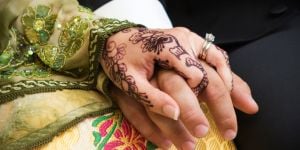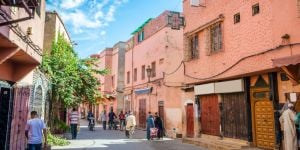Mixed Marriage Documentation for Canadians
Last activity 23 December 2023 by naimadorcy
2547 Views
33 replies
Subscribe to the topic
Post new topic
Bonjour, tous le monde. / Hello, everyone.
The user jess1406 made an excellent thread back in 2016 about her mixed marriage process in Morocco from a British female foreigner's perspective marrying a Moroccan male, however, I have heard that process is slightly different, harder or complex compared to a male foreigner's perspective marrying a Moroccan woman. For some unknown reason, a Moroccan man marrying a foreign woman has to go through more hurdles than a Moroccan woman marrying a foreign man.
Not to spill too much details of my personal life, I will share the early steps of my process from a male Canadian perspective as it is similar to most countries for which you don't require a VISA to enter Morocco or have a tangible relationship. For countries like Turkey where you can get an eVISA, there seems to be an extra step of 'authentication'. I don't know know too much details of this, but the Morocco thread on Reddit can shed more light for countries with eVISA, if anyone is curious.
I am a Muslim man who met my Moroccan Muslim fiancée online about a year ago and was engaged to her a couple months ago when I went to Morocco to visit her and met her family. I hope to get married later this year, but with travel restrictions and COVID, it may be a challenge to take my family. I have no knowledge of French, even though I live in Canada and while I can read and write (Traditional) Arabic, I cannot speak/understand the language, let alone the Moroccan dialect. Nevertheless, based on research I did using the Government of Canada, free resources on Public Immigration Services and the Public Services Portal of Morocco (only available in French and Arabic), I have detailed a list of three major factors and a hidden factor only mentioned on the Public Services Portal of Morocco:
1. Documentation I require from Canada
2. Documentation I require in Morocco
3. Documentation my fiancée requires in Morocco
*Hidden*. Applies to All Moroccans, but Some Documents May not be Required for the Foreigner
1. Documentation from Canada (Multiple Photocopies)
- Notarized Certificate of Nationality, i.e. Citizenship Card and/or Citizenship Certificate
- Canadian Passport
- Original Birth Certificate or Notarized Photocopy
- Police Record, Authenticated by Department of Foreign Affairs and International Trade (DFAIT) in Ottawa
- Notarized Medical Certificate
- Notarized Work Certificate
- Notarized Residence Certificate: What types of documents comply for the Certificate of Residency for Canada? Is it only the document issued by the CRA? Does passport, driver's license, health card or a combination of all of these comply for the residence certificate? Surely if the Canadian Passport complies for Canada, it must comply with the Canadian Embassies of any country, right?.
- Notarized Muslim Faith Certificate
- Four (4) Recent Photos of Passport Size, 3.5 cm x 4.5 cm
2. Documentation in Morocco (Multiple Photocopies)
- Eligibility to Marry Document/Capacité de Mariage, via Canadian Embassy
> Certified by the Ministry of Foreign Affairs in Rabat
- Confirmation of Nationality/Attestation de Nationalité, via Canadian Embassy
= Completed & Signed Affidavit for Two Documents Above
- Sworn Single Status Statement in French, thus resulting in the Certificate of Non-Impediment to Marriage, which can be Completed in Canada as well
- Notarized Canadian Passport, via Canadian Embassy
- Notarized Medical Certificate
- Notarized Police Record, via Ministry of Justice in Rabat
3. Documentation for Moroccan Fiancée (Multiple Photocopies)
- Notarized Copy of the National ID (Card)
- Latest Birth Certificate or Notarized Copy
- Medical Certificate or Notarized Copy
- Capacité de Mariage/Eligibility to Marry (Single Status) or Administrative Marriage Certificate
- Copy of Police Record, via Ministry of Justice in Rabat
- Four (4) Recent Photos of Passport Size, 3.5 cm x 4.5 cm
*Hidden*.
> Documentation Required to Obtain Permission to Certify Marriage for Adults
= Copy of the Birth Certificate for Both Individuals
= Administrative Marriage Certificate for Both Individuals
= Medical Certificate for Both Individuals
= Notarized Copy of the National ID (Card) for Both Individuals
> Administrative Marriage Certificate
= Copy of the Birth Certificate for Both Individuals
= Sworn Statement by the Fiance or Fiancée testifying of his/her Family Status (if applicable)
~ Certificate issued by the Court in the Local City of the Applicant, on the basis of an Investigation by an Administrative Agent, such as a Muqaddam or Islamic Official (i.e Imam/Adoul). Contains Information relating to the Marital Status of the Fiance, Fiancée, their Family Status, their Place of Residence and their Profession (official title). Profession cannot be generic 'Employee of So and So'.
I would like for anyone with knowledge on this website to confirm to me if all of these documents are the same for you if you are in a similar position as me or the exact position if you are a male foreigner seeking to get married in Morocco. Also, feel free to answer my question in BOLD if you know the answer. Keep in mind, generally speaking, all of these documents must not be older than 3 months and for Canadians, the Eligibility to Marry Document/Capacité de Mariage that is attained from the Canadian Embassy in Morocco is ONLY valid for 1 month. For some unknown reason, American have 6 months and Canadians get 1 month. After my formal marriage process is completed, I will update this thread accordingly.
Au revoir.
It is not unknow reason, the reason is female more than man in Morocco around 5 to 10 % . Thats why make harder for Morocco man marry to foreigner woman.
I am back in Canada. It has been a month since I came back. I just wanted to provide an update on my experience of the marriage process as a foreign male marrying a local Muslim woman in Morocco.
I'll give a clear update on the documentations I actually needed from Canada, in Morocco and the documentations my fiancee (now wife) required for submission in the courts. Your mileage and duration of time may vary depending on the city you are trying to get married in and the city your fiancee is from, but my experience is based on the Casablanca family court requirements and ONLY for marriage. For residency, you will require more copies or additional documentation which you should consult with the appropriate authorities.
Documents
1: Required from Canada
a) Original Passport & Photocopies (notarization not required)
b) Original Birth Certificate or Notarized Photocopy (If the courts ask for Original, give that, but you MUST retrieve and replace with a photocopy before leaving the courts that day)*
c) Police Record (Must be Notarized in Canada if there is no Stamp by the RCMP and then Authenticated by Global Affairs in Ottawa - when sending to Ottawa, use a prepaid envelope and also include another prepaid envelope or regular envelope so Ottawa can send your authenticated documents back)*
d) Work Certificate (Notarized in Canada)*
e) Single Status Certificate (Notarized in Canada, only Required by the Canadian Embassy; if you don't have this, you may have the option to draw up the document at the Canadian Embassy for a $50 CAD fee)
f) (Optional in Canada) Muslim Faith Certificate (Notarized in Canada)*
g) 4 Passport Size Photos of 3 cm by 4 cm
*Translate to Arabic in Morocco by an Authorized/Certified Translator
Note: If you have been married before, you replace the Single Status Certificate with the Divorce Certificate (Notarized in Canada) or Death Certificate (Notarized in Canada)
2: Required from Morocco
a) Eligibility for Marriage Affidavit, also called the Certificate of Non-Impediment to Marriage from the Canadian Embassy for $50 CAD fee**
b) Confirmation of Nationality Affidavit from Canadian Embassy, Fee Included with Above**
c) Police Record via the Ministry of Justice (Submit Application Online and Pickup from the Nearest First Instance - You can choose the location for Pickup)**
d) Medical Certificate (notarization not required but Stamp of Doctor required)**
e) Muslim Faith Certificate, if you don't draw one up in Canada (notarization not required, however may be required if you draw this up from scratch in Arabic)*
**Translate to Arabic in Morocco by an Authorized/Certified Translator
Note: The Embassy WILL ask you to write in a seperate piece of paper how you met your fiancee. Don't lie and just tell the truth as lying will make documentation for PR/Family Sponsorship harder. This piece of information must be shared at least once before with your spouse if you both don't have or remember the same story. The Government will verify using this information when you fill out the documentation for PR/Family Sponsorship.
2: Required from Morocco by Spouse (Woman) in Arabic
a) CNIE (Moroccan ID Card) Photocopy (Colour Preferred)
b) Extract D'acte De Naissance (Brief Copy of Birth Certificate)
c) Copie Integrale D'Acte De Naissance (Full Copy of Birth Certificate)
d) Medical Certificate (Stamp of Doctor required)
e) Administrative Marriage Certificate (Equal to a Single Status Certificate; Woman require their Mahram, i.e. Father/Guardian and 2 Witnesses, but in certain conditions, the spouse can get this on her own - For example, if your Fiancee is from a small town and the authorities know her or her father)
f) 4 Passport Size Photos of 3 cm by 4 cm
After all the documents are acquired, translated and gathered, you make at least 4 photocopies of each document, original and translations and arranged in a set. Each set of documents go to the respective parties: Court, Police, Adoul, Man/Woman and Spouse.
Process
Court
All the documents above are ordered according to the listing noted on a specific area (back of a wall) in the Court (this area is reserved for mixed marriages only) and given to the Court along with the original Passport of Canadian and ID card of Spouse. The Court may ask you to make additional copies of any document for which there are multiple copy machines you can use to make them inside the Casablanca court, not far from where you submit the documents.
You have to wait a lengthy amount of time until the Court records all your papers. It is recommended to go early (8:30 is when they open) and pick a ticket for the time slot. In my experience, 2-4 hours of waiting. If you submit before 11, you can have time to go to the Police that day.
Once all the initial process is done at the court, they will give a sealed envelope, which cannot be opened by you, to submit to another section of the Courts (upper floor). We basically had to go through brown doors, walk up the left stairs and hand the letter to a police/guard or reception at the end of a waiting area (it's hard to miss because there are benches in one end and the police/guard on the other end). After waiting about an hour or less, they give another sealed envelope for us to take to the Police.
Police
If you are in Casablanca, you go to the Police Prefecture of Casablanca, South of the Villa des Arts Museum/Cultural Centre. The court will tell you where (let your spouse do all the communicating if you don't know Arabic) to give the envelope, but you should ask again at the Police Station to know the floor number and area. It may have been the 4th or 5th floor (confusing to remember since floor naming scheme is based on the French system), but I do remember the initial place where we submit the envelope is to the right of the building after exiting the main stairs/elevator.
Note: There are two main stairs: one to the right of the elevator and one to the left. Also, memorize any important information saved on your phones or ID numbers as you will relinquish these upon arrival. The Police keep your phone and ID to enter and you get them back when exiting.
The department in that top floor area opens the envelope and will then ask you to go to another floor (a certain lower level) to give to another department which I presume handles interviews. Again, I don't remember the floor, but do remember this area requires going straight if you exit the left stairs through some doors (second set of doors, not first - the first set of doors is to exit the stairs/elevator area) and then go left to an open area that has a few rooms and washrooms at either end of the corridor with some seating area for couples. If you are lucky and go with other couples to the Police station, you will have a much easier time navigating.
Now, the next part is where exceptions may be provided for you depending on many circumstances. As my wife and I submitted our documents on a Friday morning and went to the Police Station in the afternoon, we didn't require to do any interviews. Fridays are like a 'short' days in Morocco and no one wants to do extensive work if they can avoid it, police included. My wife and I arrived to the interview area with 4 other couples, thus this would mean 10 interviews. Based on what I have heard and read, these interviews can be quite lengthy and difficult to conduct. So, the police in that department waived the actual physical interviews and only asked us to fill out a single document that stated the same basic information we had filled out multiple times in our application process. As you will have a copy of the same court documents for the police, you can use the information from these to fill out the form. Also, the police will have a question about how you met you fiancee. Provide the same information just as you did for the Canadian Embassy. Information has to be written in Arabic, so let your fiancee fill it out. There will be only one small section for you to fill out, either in French or English,
Before leaving the police, you sign some documents, submit your set of documents as you did for the court (remember, the courts will have all the originals, including the translated originals and the police will only have copies of the originals and copies of the translated originals). And then the waiting begin.
Court
The police will tell you a rough estimate of when you can expect your document is returned to the court, but that figure is highly unreliable. My wife and I was quoted 4 days, but in reality we waited 10+2 days. Don't use my numbers as a guide as it can vary from application to application, circumstance to circumstance. You can add pressure/annoyance to the Police (if you can find the exact person who takes your documents) by visiting a few times after the quoted time to ask about the status and if it was sent to the Court. If you get a confirmation the document was sent or will be sent to the Court, you can visit the Court directly on that specified day. My wife and I visited the Police twice after the quoted 4 days and on the second visit we were told it would be in the Court, 'the next day'. So, we went to the Court directly on that next day (for us this was a Monday as the police is closed on weekends for court proceedings) without going back to the Police. However, when we arrived at the Court, we inquired about the document again and they told us it wasn't ready, but we filled out another form, which may have sped up the process (and we came back on a Wednesday). From what I was told, if I came to the court on this day (Monday) and showed proof of a next day flight, I could get the documents that very day.
So, on the Wednesday, we intially waited for the document on the upper floor, but was told to wait in the main hall. This is where most other couples would be waiting, too. When your document is ready, the court will ask you to go back to the main area where the documents were originally submitted who will give you the final documents to sign and your official marriage (court) license. This process (mostly the waiting) can take a few hours, as well.
Mabrook. You are now officially married according to the court. However, the Nikah process is next.
Nikah
Prior to COVID, this process was done in large rooms (many people still do it this way evading the law) and you could invite Adouls to the event for a fee. However, after COVID, many Adoul have taken a safe approach and asks you, your fiancee, fiancee's parents and your witness (parents, family, friends) to come to their office. According to Moroccan law, 2 Adoul must be present for the Nikah to take place, but from what I understand, normally there would be one main Adoul and his secretary or underling to witness the Nikah proceedings. Side note, the underling can be a woman, while the main Adoul has to be a man.
If you get to this stage, whatever happens next is straight forward as you will follow directions from the Adoul and communicate with your fiancee to sign the respective documents and pay the Adoul MAD fee (varies and can be more for mixed marriages, try to find an Adoul who is reasonable and isn't taking advantage of you). I don't know if the next step is the usual process, but our Adoul submitted our signed documents on our behalf back to the court who stamped the document and returned back to the Adoul. When this final document was ready, the Adoul contacted us to come back and we picked up the document. One original for me, another original for my spouse. Feel free to make English/French translations of any new documents before you return back to Canada as you will require them for PR/Family Sponsorship.
Final Points
Congratulations. You are now officially and legally married according to Sharia, according to Moroccan law and according to marriage law recognised in Canada.
Make sure you document and take lots of pictures (except at the police) in every step. If documents are translated prior to your visit to Morocco and the appointment at the Embassy is on the same week you arrive, the marriage process can be as fast as 3 weeks. My process took 5 weeks waiting for translations, travelling to Rabat twice and visiting the police and courts several times.
Honestly, this is not the way a mixed marriage/foreign marriage should be done, but frankly until Morocco adopts an open standard which is communicated with the police and courts, this is the process foreigners have to go through right now.
About the Canadian Embassy: Due to COVID, appointments for Notarial Services are only available on a Friday. If you go with your fiancee, don't miss your appointment time and keep all your belongings with your spouse and take only the documents you need. At the Embassy, they will search your body and bags and keep your phone or other electronic devices, including watches.
Unfortunately, you won't be able to get your Affidavits on the same day you visit for the first time. Pick-up is 72 hours after initial appointment time, meaning, the earliest pick-up time is Monday (I had to go on Tuesday as Monday was fully booked). They say to book for pick-up after you get a confimation, but you can do this right after you exit the Embassy. Don't book a pick-up time earlier than this as your documents may not be ready since appointment time slots are at 10 minute intervals, but inside the Embassy, the process is slower as 1 person is allowed at a time, so if you book a pick-up time earlier than the finish time of your appointment, your document won't be ready for you. Also, pick-up time is exclusive to PM, while Notarial Services are exclusive to AM.
If anyone has any questions about any stage, leave a comment below.
Correction to this Note: If you have been married before, you replace the Single Status Certificate with the Divorce Certificate (Notarized in Canada) or Death Certificate (Notarized in Canada)
In the event of a Divorce Certificate, you must have that Authenticated by Ottawa along with the Police Record. As you can't give the original Divorce Certificate, you make a Notarized 'True Copy' and then send that.
@NotBrandonSaad Many thanks for the detailed explanation.. since few months Im reading your post every time on time.. really its complex and unexpected , especially for someone who doesn’t have enough time
Could you please give me more clarification about:
1-how much time did it take to translate documents and costs
2-how much time did islamic Nikah take
3-is there anyway, you know about, to speed up these previous steps
And thanks in advance
I would appreciate also to know about documents and procedures needed in your case for Pr or family sponsorship
Have a great day
Yes. It is really complex, but having gone through it with the help of my wife, I am confident I can help anybody looking to get married in Morocco, with some caveats, of course, since my perspective is marrying through the Casablanca court system while others that have contacted me are marrying from other cities. If you need further help, advice or general conversation about culture or expectations, you can call me on my mobile or WhatsApp (available via private message).@NotBrandonSaad Many thanks for the detailed explanation.. since few months Im reading your post every time on time.. really its complex and unexpected , especially for someone who doesn’t have enough time
Could you please ... - @brssth
1 >>> Depends on the translator and how good you are at negotiating a fair price based on number of pages or physical size of document. It can range between 100 DH to 500 DH per page. Negotiating is key in Morocco, so try to find someone that works for you or shop around with other translators. As an example, 100 DH document can be something like an ID card (if you are able to photocopy/scan both sides in one), while a 500 DH per page document would be a lengthy divorce document or citizenship certificate. Generally, you would submit via email all the documents from Canada to the translator for a quote, thereby beginning the negotiating process, and the translation should be done when you arrive. If you submit the document when you are there, it will take longer. The initial translation should not be more than a few days (2-4), but if the translator is busy, it can take a week. As a general rule, reserve up to 2000-3000 DH for all translations. There will be more translation required for documents you get in Morocco prior to the Nikah, such as your Embassy documents, so keep that in mind. Tip: To avoid any authenticity issues, get your Arabic marital contract translated in Canada by a certified translator as you don't need to include an affidavit.
2 >>> The actual Nikah should not be more than a couple hours. You (fiancee and parents/witness) literally sit down with the Adouls in their office and go through the registration of the marriage, signing of the contract, signing from the witness/parents and a prayer shortly after. But that document needs to be stamped by the marital court, so you will have to wait more time (this process as I mentioned in this thread can be done by the adoul), and then stamped by foreign affairs in Rabat to make the contract legally binding. If your fiancee or in-laws want a party, bringing the Adoul to the event will cause delays.
3 >>> There is no legal way to speed up any process. Not even the translation as some translators will get their underling to do the grunt work while they review and stamp versus translators that do it on their own taking much longer, hence submit a week before you arrive. If you have connections with the judge or police in a small town where you submit the documents, you can shorten your time down by a week. Best case scenario is three weeks without 'tipping'. And if you don't do anything in advance, it can take 5 weeks. Tipping or bribing can be done, but I have not heard of any successful stories in my circles from my wife. Her friends adviced not to do it. Certain cities/towns may expect it. I have only heard of successful stories of that practise on this website which my wife confirmed does happen. Which cities/towns? I don't know.
I would advice to not do it and just spend three weeks in Morocco with everything you can do before coming sorted out while everything that you do in Morocco is simple things like picking up your translation, getting a medical certificate in Morocco (needs to be translated), picking up your police record, and then submitting to the court with your fiancee's documents. If you can see the Embassy (and Embassy documents stamped by foreign affairs) and submit the all documents (translation and original) to the court within 5-7 days, you will have enough time to wait for the police process to be done and get your permission for marriage to see an Adoul by the end of the second week, thereby giving you the final week to finalise your contract.
>>> You will need to contact me for a phone call if you want to know about PR/FS application procedures. Start off by reading the full guideline and then go through the checklist and see what applies to you. If you have concerns or questions thereafter, I can answer that. I hired an immigration lawyer (which I don't recommend because it's really expensive) who helped me with the language and wording of certain questions and many other things I wouldn't have known if I had done it myself. I cannot legally give you any advice on my personal file, but can answer general questions about anything from the checklist or any specific IMM document.
- Non-Canadian Birth Certificate
- Authenticated Police Record Check
- Authenticated Ontario Divorce Certificate
- Work Letter
- Muslim Faith Certificate
@thekey Not for the birth certificate. Doesn’t matter as long it is the original (has a clear physically signature and stamp). Mine was re issued in 2017 (as we lost my original long time ago).
For Notarized Residence Certificate, what document applies for this. I live in US currently in Texas and there is nothing here that I know of that gives us this proof. Would my driver license (which has my address) be sufficient?
I'm curious what you used for this requirement, if it was even asked.
@NotBrandSaad Couple questions that popped in my head while waiting for RCMP check to be authenticated.
For the work certificate I'm getting a letter from my employer, but I was wondering if pay stubs are sufficient too?
Also since I live in the USA as a Canadian citizen do you think it's fine if I just get documents not specific to Canada notarized in USA or is it better I go to Canada and get everythign notarized there?
Pay stubs are only sufficient with a work letter/certificate. Paystubs are not sufficient on their own. Paystubs used to be required with work certificates, but no longer required to make the process easier. Three months of paystubs is a lot of documents if you get paid biweekly (imagine having to translate all of them).
It shouldn’t be hard to get one, just ask your HR or supervisor. Just needs to be an official document with the letterhead of the company and financial information regarding your income (annual salary or if not on salary, hourly rate, rate of payment, number of hours per week, total hours worked), the date you started, and preferably if you are able to get a custom letter (optional), your passport number, date of birth and address.
Yes. You can get your documents notarized in the US, even in Morocco (but you have to show/prove original which is harder if they don’t believe you). You just cannot do it for official documents like the police record (rcmp version or local version). Don’t notarize a copy of your passport or birth certificate. You can give a copy of the former at the court in Morocco. No need for notarization.
@NotBrandonSaad
When going to the Canadian embassy in Rabat, do they require the physical national ID card of fiance? Can she send me a photo of it or even just the id number is enough? If they need the physical card, does she need to come with me to the embassy or can I borrow her card?
@thekey Yes. You will need to take her CNIE card. No photo, only original. They will take a photocopy to create the Eligibility to Marriage document (her info and her parent's info from the card will be on the document). And no, non-Canadians/dignitaries are not allowed in. You will have to show your passport just to get through the security.
Alhamdulillah, just wanted to update this thread that I've managed to complete the process and we completed the aqd/nikkah. In total I spent exactly three weeks in Morocco, but the actual processing time for once we first went to the court to when we signed the aqd was a week.
To summarize what I did.
- Arrived in Morocco on Oct 6th.
- Had Canadian embassy appointment on Oct 7th (Friday).
- Picked up documents on Oct 12th (Wendsday). There was a holiday on the monday (thanksgiving in Canada, the prophets birthday in morocco) which made us wait until the 12th to pick up the documents.
- I had all my papers translated before I got to Morocco by a translator in Rabat. Unbeknownst to me, after I got my embassy papers and brought it to the translator, she informed me I had to get it stamped by the ministry of affairs which was luckily 2 min walk away from her office. Once I did that, she gave me all the translations and even completed the ones from the embassy within the time I was in her office.
- Note: When you are going to the Ministry of affairs, you'll likely be holding a beige envelop which have the embassy documents. There are scammers that know that and see you walking and will hassle you to "expedite" the process for you if you pay them. Don't bother doing that, just go straight to the office. It will take you no more than 20 min to get the papers stamped and signed.
- I travelled back from Rabat to my wife's city (Tangier), the adl informed us that we will submit the documents on Oct 17 (the next monday).
- On Oct 15 I realized, I had forgotten to do the police criminal check in Rabat. But you can do this online and I applied on the Saturday. No progress was made on the application until Monday Oct 17. The documents were signed digitially and you can check status of the document with the code they give you in applying. I picked up the document that same day. So I only lost one day of work because of this.
- On Oct 18 we went to the court with the adl. They told us to come back on Wednsday after going to a few different offices in the same family court building.
- We picked up the envelope from the court on Wednsday. We then had an appointment with the police on Thursday morning (again we went with the adl). They asked some simple questions about our work, school, income, etc. They told us by Oct 24 (monday morning) it will be ready.
- The adl picked up the envelope from the police on the monday and took it to the family court to get processed.
- On Oct 25th we were given permission to perform the aqd. On Oct 26th we signed it.
Some general advice for future readers and persons going through this process.
- Morocco will specify for many applications documents you need but they often don't even look at them. Example, the morocco criminal check website says you need to bring some 10dh stamps and a copy of your passport when you go to pick up your report. In actuality they don't look at your passport photo or ask for the stamps. These kind of things will be annoying but just do them anyways as you never know the mood of the person handling your applications/files will be like
- I recommend you work with an adl instead of going to the courts and police on your own. Now that I think about it, we never actually waited in line for anything. Appointment with the police was made without us having to even go there. You can do all this without an adl but we actually paid him extra to speed up the process.
- If you are going to pay extra for an adl to do bribes and such, don't pay him upfront. Let him do the work first and then once you are given permission to get married, then pay him. In total we paid him 1500 dh, 1500 dh for "bribes" that he handled. This is only ~300 dollars, so it was worth it imo. It would have costed me another $500 at the minimum to stay a week longer in Morocco.
- Lastly, be patient and just go with the flow. This whole process is honestly stupid to me. They make you go to the family court, you wait for papers from one office, then take it to another and then they tell you come back in the next day. I don't know why they don't just send it to the office themselves, it's all in the same building. Also you will be doing a lot of stamping and signing. Most of these employees barely read the documents and just stamp it blindly. It's mostly all beauracracy. So just try to make it fun and laugh at the stupidity of all these processes. I recommend you go with someone so you don't get bored.
Just wanted to say thank you to @NotBrandonSaad for all the information you provided here. I found it a huge resource which I frequently checked to make sure I was doing the right thing.
@NotBrandonSaad do you have any information on what the immigration process is like?
Thank you so much for the update and detailed post, thekey.
It is very much appreciated. I am sure it will be useful to members.
Thanks again,
Bhavna
@NotBrandonSaad
Hi
I was going through your experience about morroco,I need some advice is any chance we could catch up on watApp please.
Thanks
@thekey
hello the key i was wondering if i can speak to you directly about this on whatsapp?
@djam004
did anyone get back to you on this?
Hello,
I have a question, i am going to marry a moroccan gir in tangier and i am from canada.
It takes around how much time to get everything done ?
Thank you
@ave03 two weeks if everything completed and correct
Articles to help you in your expat project in Morocco
 Getting married in Morocco
Getting married in MoroccoIf you want to get married in Morocco, there are different steps and a variety of procedures to follow. These can ...
 Choosing your neighbourhood in Marrakech
Choosing your neighbourhood in MarrakechMarrakech comprises five leading neighborhoods, namely Medina, Mellah, Gueliz, Hivernage and Chrifia. Each of them ...
 Casablanca neighbourhoods
Casablanca neighbourhoodsStretching over 220 km², Casablanca is more than twice the size of Paris. Like all historical cities and ...
 Making phone calls in Morocco
Making phone calls in MoroccoDuring your stay in Morocco, you will certainly wish to keep in touch with friends and family. To do so, you can ...
 Getting around Marrakech
Getting around MarrakechIn Marrakech, there are many means of traveling inside the city and outside, whether for work or leisure. Each of ...
 Opening a bank account in Morocco
Opening a bank account in MoroccoOpening a bank account in Morocco is relatively easy. The language barrier could be an obstacle if you do not ...
 Driving in Morocco
Driving in MoroccoYou can drive with an international driver's license in Morocco for a period of one year as from your date of ...
 Getting around Casablanca
Getting around CasablancaMoving around in Casablanca is a day-to-day challenge. However, the city has a fairly developed ...
Find more topics on the Morocco forum



